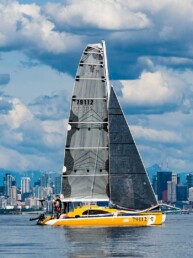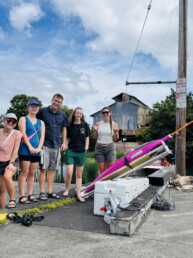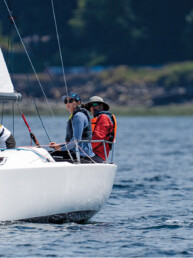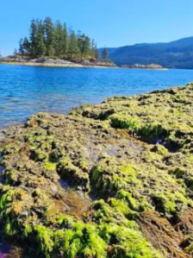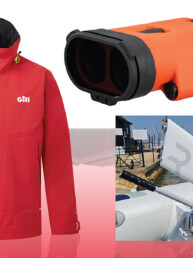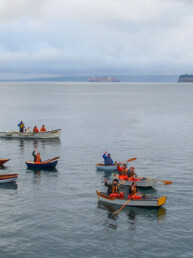The US Sailing presentation on Diversity, Equity and Inclusion (DEI) is an important invitation for any sailor to listen to—and learn from—the perspectives, experiences, and insights of an incredibly talented panel.
On August 3, US Sailing had Ayme Sinclair host a panel on their Diversity, Inclusion, and Equity (DEI) program with panel guests Karen and Joey Harris, Lou Sandoval, and Captain Bill Pinkney. It was one of the best moderated panels on diversity I have seen in my fifteen years of diversity exploration and work.
US Sailing is doing some amazing and essential anti-racist work. They recently put out a statement saying:
“We are devastated by the recent events and stand by the Black community and all who have been subjected to injustice and inequality. The sport of sailing has a long way to go before achieving equal access and inclusion. We are committed to listening, learning, and being a part of the solution.”
In a time with much uncertainty, we need to come together more than ever and organizations creating missions like this provide leadership and help move us forward.”
Why this is so important
When explaining why we need diversity programs in clubs and sailing programs, Karen Harris had three main points.
- It’s the right thing to do.
- Overall US demographics are changing, and the future of sailing and yacht clubs will include more BIPOC (Black, Indigenous, People of Color).
- Being more inclusive will increase members and funding for yacht clubs.
They started the talk with basic definitions. Paraphrased, Karen Harris described diversity as the invitation to the dance, equity as making sure you can get to the dance, and inclusion as making sure you dance. Lou had a lot of good statistics in the presentation to back up the cause. Gen Z (currently ages 5-25) value inclusion and make up 27.3% of the population. Women are 51% of the population and obviously diverse in race and ethnicity. Sadly, 0.01% of sailing is diverse in ethnicity, gender, or sexual orientation. Lou outlined that the untapped potential boat buying market for BIPOC and women is estimated at $3.9 trillion in the market today.
The panel generously shared some of their struggles with racism in sailing. Each of these extremely skilled sailors and community leaders had examples of blatant racial profiling. White sailors approached them assuming they worked in labor roles at the yacht club, they didn’t belong there at all, and even suggested they were trying to steal their own boats. All of the panelists agreed that this is a common experience for BIPOC. Similarly, I hear many stories of sexist bias and behavior toward women in sailing. I often say that if you really want to know the state of the world, listen to black women. Their experience of the intersections of racism and sexism give them a very clear vantage point of where we need to change and grow in our culture. All of these assumptions and behaviors are all examples of why BIPOC, LGBTQ people, women and disabled folks either stay away or quit the sport. We need to do better.
Ideas to help sailing become more diverse, more equitable, and more inclusive
US Sailing, and other organizations—like Women Who Sail and the National Women’s Sailing Association—are trying to work toward a goal of a more equitable and, eventually, equal playing field. The panel gave many examples of how to move forward to this goal. They emphasized that, to start, community leadership needs to name the issue and explore it. We need more internal diversity in organizations and leadership. Look around your board rooms and ask: Who is missing? We need mentors and leaders that look like the folks we would like to introduce into the sport. Then, organizations need to create a plan to reach out to folks with invitations to participate.
The US Sailing DEI panel gave lots of ideas to do this, like partnering with professional and community organizations that are already tapping into the audience you would like to reach. Whether it is reaching out to black doctors and lawyers, or youth LGBTQ programs, this is the time to collaborate and these organizations already exist to assist with the interests of certain populations.
Lou clearly stated that the pitfalls of this work are assumptions, lack of understanding, and acts of symbolism without action. This has been my observation over the years, that movements like Black Lives Matter will get some media and traction, white people will show up and post memes and articles or perhaps even join a march or protest, then disappear; going back to the status quo from which they benefit. That is privilege.
Key to advancing these causes in sailing, there is a DEI resource page for US Sailing Initiatives, where you’ll find a lot of information there and links to resources. They also invite you to write in your ideas of how to grow community. I am going to share my race idea that Sloop Tavern Yacht Club (STYC) ran in July as an example of equity in a race. I came up with the idea after reading the World Sailing Trust report on gender inequality in the sport and saw in the SARC that out of 300 races in the PNW, we only had five for women. We had no other races designed for diversity or inclusion. It was clear to me that, while we have many amazing women sailors in our area, very few own race boats or are driving on start lines. This is due to many factors like income inequality, cultural bias, and gender roles. Women at the Helm was designed specifically to provide equity, inclusion, and representation for women, and give them an opportunity to lead. The race was a huge success with 30 boats out that day and I hope STYC will run it again next year. What would other races or community events for BIPOC, LGBTQ, and disabled folks look like in the PNW?
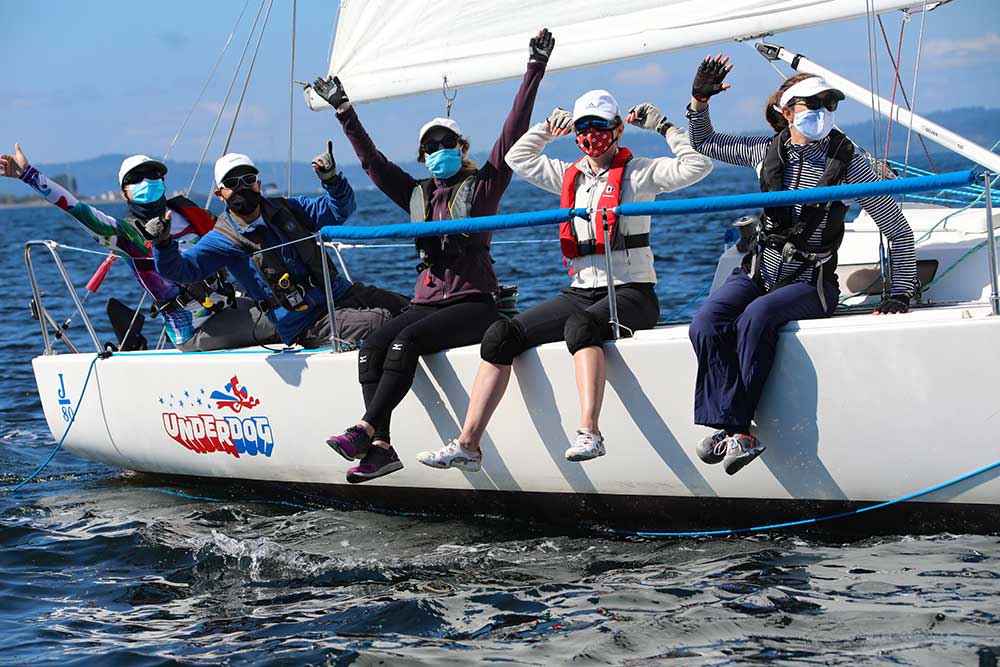
Don’t get discouraged if it’s complicated
Karen Harris had a bit of advice for when you run into road-blocks in this work. She said, “If you can’t start something where you are, then start somewhere else.” This made me think of how Women Who Sail started. Charlotte Kaufman was trying to ask questions in a mixed gender group and received belittling, rude, and sexist comments. She was so put off she decided to create a space just for women to discuss sailing with respect and kindness. Much like the US Sailing DEI initiative, part of the Women Who Sail mission is anti-racist and anti-sexist. We are trying to bring in male allies through the Newsletter and our public pages on Facebook and Instagram, providing an opportunity for them to listen to women’s stories and start to understand and work with bias in order to create change.
Diversity work can be complicated and messy. We all make mistakes in it, and hopefully can grow from them. A lot of times people aren’t sure where to start and have to do a lot of trial and error. We all have blind spots that are racist, sexist, ableist, or homophobic. One of the responsibilities we have individually and collectively, especially if you are white, is to listen to more folks who are different than you and understand their experiences and needs. When BIPOC, LGBTQ, Women, and Disabled folks tell their stories and state their needs: listen. Especially if it makes you uncomfortable. Discomfort is a sign that you are going in the right direction.
Understand that racism is something embedded in our culture and systems and, whether you personally hold those beliefs or not, you are participating in a racist society. We need to be actively anti-racist to combat it, and that is what the DEI panel was suggesting and giving strategies for specifically with regard to sailing.
It’s time we reckon with this history and change it for the future, in sailing and beyond. We have lots of opportunities as the world is changing daily around us. I am often reminded of the equanimity of the sea and how when you are on the water, we are all sailors and at its whim. Captain Bill Pinkney talked about the special camaraderie of maritime folks. He spoke about how, when you are on the water, you put aside any differences to help others. Because in his words, “Once you go to sea, it’s the same for everyone.” This is so true, and to create that kind of equanimity we need to name difference and create equity first—so we can all meet out there and view one another with respect as sailors.
Fair winds to all.
Watch the full panel discussion here:
Title background photo courtesy of Sail Sand Point.
Jenn Harkness
Jenn Harkness is a human being, artist, coach, therapist, writer, friend, mermaid, student of life and lover of all shine and sparkle. She is excited to be the new Editor-in-Chief of the Women Who Sail Newsletter, facilitating the mission of amplifying women’s voices and creating a kinder world through the content. She owns Poop Deck, a Ranger 29, and avidly races and cruises in the beautiful waters of Puget Sound. You can follow her adventures and hopefully gain unique and sometimes hilarious insights about feminism, mental health, and sailing over at skipperjenn.com

